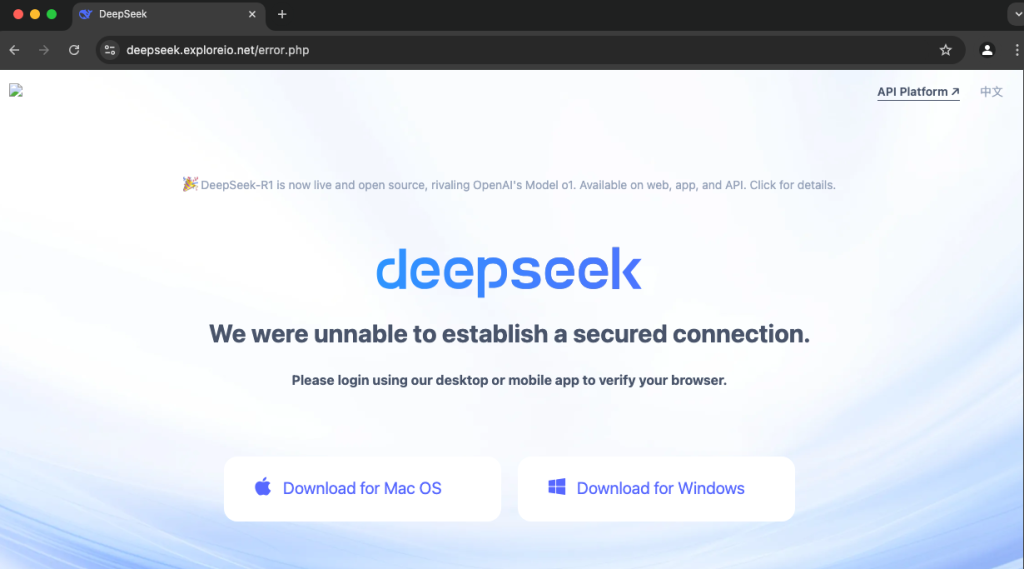

Cybersecurity researchers uncovered a sophisticated malware campaign targeting macOS users through a fraudulent DeepSeek.ai interface.
Dubbed “Poseidon Stealer,” this information-stealing malware employs advanced anti-analysis techniques and novel infection vectors to bypass Apple’s latest security protocols, marking a significant escalation in macOS-focused threats.
The attack begins with malvertising campaigns redirecting users to deepseek.exploreio[.]net, a near-perfect replica of the legitimate DeepSeek.ai platform.


Unsuspecting victims clicking the “Start Now” button trigger a download sequence for a malicious disk image file named DeepSeek_v.[0-9].[0-9]{2}.dmg hosted on manyanshe[.]com.


Upon mounting the DMG, users encounter instructions to drag a file labeled “DeepSeek.file” into Terminal for installation.
This technique exploits macOS’s shell script execution permissions, bypassing GateKeeper protections enhanced in macOS Sequoia that previously blocked unsigned applications via traditional launch methods.
eSentire analysts note this Terminal-based execution method represents an emerging trend among macOS threat actors: “The shift towards command-line interface abuse reflects adversaries’ adaptation to tightened security controls in recent Apple updates”.
The shell script (DeepSeek.file) employs multi-stage Base64 encoding to obscure its malicious intent. When decoded, the script performs:
cp "/Volumes/DeepSeek/.DeepSeek" "/tmp/.DeepSeek"
xattr -c "/tmp/.DeepSeek"
chmod +x "/tmp/.DeepSeek"
/tmp/.DeepSeekThis sequence copies the malware binary to a temporary directory, strips security attributes, grants execution privileges, and launches the payload.
The stealer incorporates multiple anti-debugging measures, including:
if ((kp_proc.p_flag & P_TRACED) != 0) {
exit(1);
}Data Exfiltration Capabilities
Poseidon exhibits comprehensive data harvesting capabilities, targeting:
A deceptive password prompt validates credentials via AppleScript before proceeding with data collection:
Display dialog “macOS needs your password to continue…” default answer “” with hidden answer
All exfiltrated data gets compressed and transferred via cURL to 82.115.223[.]9/contact using POST requests.
Security teams analyzing intercepted payloads observed structured archive formats containing separate directories for browser data, financial documents, and system metadata.
Mitigation Strategies
Organizations should implement:
The emergence of macOS-specific malware-as-a-service offerings like Poseiden Stealer highlights the growing profitability of Apple ecosystem attacks.
With threat actors investing in advanced macOS reverse engineering capabilities, security teams must prioritize monitoring unconventional execution patterns even on traditionally “secure” platforms.
Free Webinar: Better SOC with Interactive Malware Sandbox for Incident Response, and Threat Hunting - Register Here
Brinker, an innovative narrative intelligence platform dedicated to combating disinformation and influence campaigns, has been…
A recent investigation by cybersecurity researchers has uncovered a large-scale malware campaign leveraging the DeepSeek…
A recent malware campaign has been observed targeting the First Ukrainian International Bank (PUMB), utilizing…
A newly discovered malware, dubbed Trojan.Arcanum, is targeting enthusiasts of tarot, astrology, and other esoteric…
A sophisticated phishing campaign orchestrated by a Russian-speaking threat actor has been uncovered, revealing the…
A sophisticated malware campaign has compromised over 1,500 PostgreSQL servers, leveraging fileless techniques to deploy…